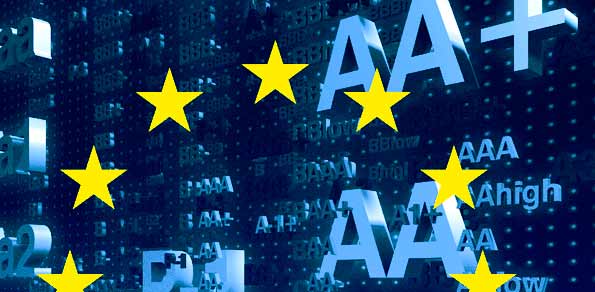A week in politics is often described as a long time, perhaps “the markets” have forgotten Standard & Poor’s ‘form’ were downgrades are concerned. Following its earthquake downgrade of the United States’ sovereign debt rating from AAA to AA+ on August 5, Standard & Poor’s downgraded several major U.S. and European banks in the final week of November whilst upgrading several Chinese financial institutions.
Trapped in its sweeping negative assessment were some of the biggest names in the U.S. banking sector, including Bank of America, Citigroup, Goldman Sachs, JP Morgan, Morgan Stanley, Bank of New York Mellon and Wells Fargo. S&P, however, raised its ratings on Bank of China and China Construction Bank Corporation.
Major European banks downgraded include HSBC Holdings PLC and Barclays PLC of the United Kingdom, Banco Santander of Spain, BNP Paribas, Societe Generale, and Credit Agricole of France, Deutsche Bank and Commerzbank of Germany, Credit Suisse and UBS of Switzerland, and the ING Group of the Netherlands.
At the last count there’d been fourteen ‘Merkozy’ meetings over the past twenty one months. As to whether or not the past weekend’s meeting counts separately to yesterday’s, or whether it simply counts as one including the stretch to the December 9th meeting of meetings, which now overtakes the ‘meeting to end all meetings’, which took place at great expense and razzmatazz in Cannes in November is unclear. What is clear is that once again the Eurozone leaders have painted themselves into a corner. The ratings agencies Sarkozy in particular places so much faith and store in have finally issued a do or die ultimatum; “fix this or face a downgrade which will cause a tipping point to be reached”.
The tipping point is simple to visualise; if Germany loses its triple-A status, there will be forced selling of Bunds. There’s also the EFSF (euro zone rescue fund), if France and Germany are downgraded it (the fund) loses its triple-A rating. Without that AAA rating the risk on the EFSF could be too expensive to bear rendering the focal point of the rescue useless.
The message is unequivocal and unemotional, ratings agencies don’t “run out of patience”, their metrics are not subject to interpretation, they have protocol and guidelines to follow. The agencies view Hungary, Austria, Germany, France etc. as being in the same basket of miscreants as the PIIGS. The difficulty is how to stop the downgrade from AAA. To expect a climbdown of the threat simply because the Merkozy alliance makes more well crafted speeches on Friday packed with the usual empty rhetoric of: “unity, stability, co-operation, revisions, time-tables”, is naive in the extreme. The time for action actually passed some months back, it is quite frankly miraculous that the Eurozone leaders have reached this stage without their respective nations being downgraded.
The ‘game’ has now reached the end zone, this meeting to end all meetings on Friday 9th December marks the end of the volumes of chatter. The carefully crafted impression that the Merkozy alliance is ahead of the curve and in control is now shattered. Their only hope, in order to wrestle back control, is to convince S&P and “the markets” that they have a plan to backstop the circa €2-3 trillion needed to prop up potentially defaulting countries and it comes down to this simple point; either the ECB acts as the banker of last resort and engages in quantitative easing or it doesn’t. If not the game is up…
Overview
The euro fell for a third day after S&P’s announcement, which put European nations including the six AAA-rated countries on watch for potential downgrades pending the outcome of a Dec. 8-9 leaders summit. The 17-nation currency declined 0.3 percent to $1.3367 at 12:47 p.m. in Tokyo. Asia stocks dropped for the first time in seven days.
The yield on France’s 10-year bond jumped 11 basis points at 8:54 a.m. in London, with the similar maturity German bund yield climbing three basis points. The euro weakened 0.2 percent to $1.3376, while the Swiss franc depreciated against all 16 major currencies tracked by Bloomberg. The Stoxx Europe 600 Index slid 0.2 percent, and S&P 500 Index futures increased 0.1 percent. Nickel and wheat led commodities lower.
Market snapshot at 10:00am GMT (UK time)
In the early morning Asian session the main Asian Pacific indices closed down. The Nikkei closed down 1.39%, the Hang Seng closed down 1.24%, the CSI closed down 0.2%. The ASX 200 closed down 1.37%. European bourse indices have fallen moderately in the morning session, the STOXX 50 is down 0.59%, the UK FTSE is down 0.42%, the CAC is down 0.53% and the DAX is down 1.30%. The SPX is currently down 0.2%, Brent crude is 0.38% and spot gold is down $4.78 per ounce.
Economic calendar data releases that could affect the afternoon session’s sentiment
There are no calendar releases that are graded as having a potential for impact this afternoon.






Comments are closed.